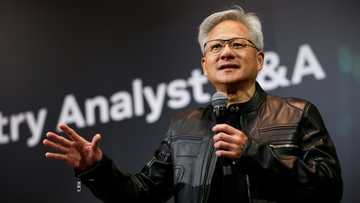Trump, Intel announce deal giving US a 10% stake in chipmaker

Source: AFP
Chipmaker Intel has agreed to give the US government a 10-percent stake in its business, the company and President Donald Trump announced Friday.
The deal came after Trump's administration said Intel should give Washington an equity stake in exchange for large grants committed when Joe Biden was president.
Under the agreement, the US government will receive 433.3 million shares of common stock, representing a 9.9 percent stake in the company, Intel said in a statement.
This amounts to an $8.9 billion investment, funded partially by $5.7 billion in grants awarded but not yet paid under the CHIPS and Science Act -- a major law passed during Biden's term that Trump has criticized.
The other $3.2 billion comes from an award to the company as part of the Secure Enclave program, Intel said.
The $8.9 billion investment would be in addition to $2.2 billion in CHIPS grants Intel has already received, taking the full amount to $11.1 billion, the company added.
"The United States of America now fully owns and controls 10% of INTEL," Trump posted on Truth Social.
He claimed that the country "paid nothing for these shares" after negotiations with Intel CEO Lip-Bu Tan.
Intel noted in its statement: "The government's investment in Intel will be a passive ownership, with no board representation or other governance or information rights."
Referring to a meeting with Intel last week, Trump told reporters Friday: "I said, I think you should pay us 10 percent of your company."
"I said, I think it would be good having the United States as your partner... they've agreed to do it, and I think it's a great deal for them."
Commerce Secretary Howard Lutnick said Friday on X: "This historic agreement strengthens US leadership in semiconductors."
'Slippery slope'
Intel is one of Silicon Valley's most iconic companies, but its fortunes have been dwarfed by Asian powerhouses TSMC and Samsung, which dominate the made-to-order semiconductor business.
The CHIPS and Science Act was aimed at strengthening the US semiconductor industry, and the Biden administration had unveiled billions in grants through it.
It finalized a $7.9 billion award in direct funding to Intel in November 2024, according to a US Department of Commerce statement.
"This is a slippery slope," independent tech analyst Rob Enderle said of the United States taking a stake in Intel.
"This is one of those things that kind of brings chills because it's a step toward nationalizing private business."
Scott Lincicome of the Cato Institute, a Washington think tank that promotes limited government, said on X Friday that the government having a stake in Intel would be "a terrible decision, bad for almost everyone."
He said it would be "bad for Intel's long-term viability, as politics, not commercial considerations, increasingly drive its decisions" and that "foreign governments might also target it."
In a statement, Tan of Intel said it is "deeply committed to ensuring the world's most advanced technologies are American made."
The company said it is investing more than $100 billion to expand its US sites.
Earlier this month, Trump had demanded Tan resign after a Republican senator raised national security concerns over his links to firms in China.
Japan-based tech investor SoftBank Group also recently said it would invest $2 billion in Intel.
Source: AFP





